-
Car Reviews
- All reviews
- Midsize SUVs
- Small cars
- Utes
- Small SUVs
- Large SUVs
- Large cars
- Sports SUVs
- Sports cars
- Vans
Latest reviews
- Car News
-
Car Comparisons
Latest comparisons
- Chasing Deals
The second generation of Toyota’s C-HR has landed as a hybrid-only proposition – so how does it perform as a style-focused urban SUV?
The Toyota C-HR presents a unique proposition in the Japanese automaker’s lineup.
As one of three small SUVs Toyota sells, along with the more practical Toyota Corolla Cross and the smaller Yaris Cross, this affords the C-HR the ability to lean into a much more style-focused positioning.
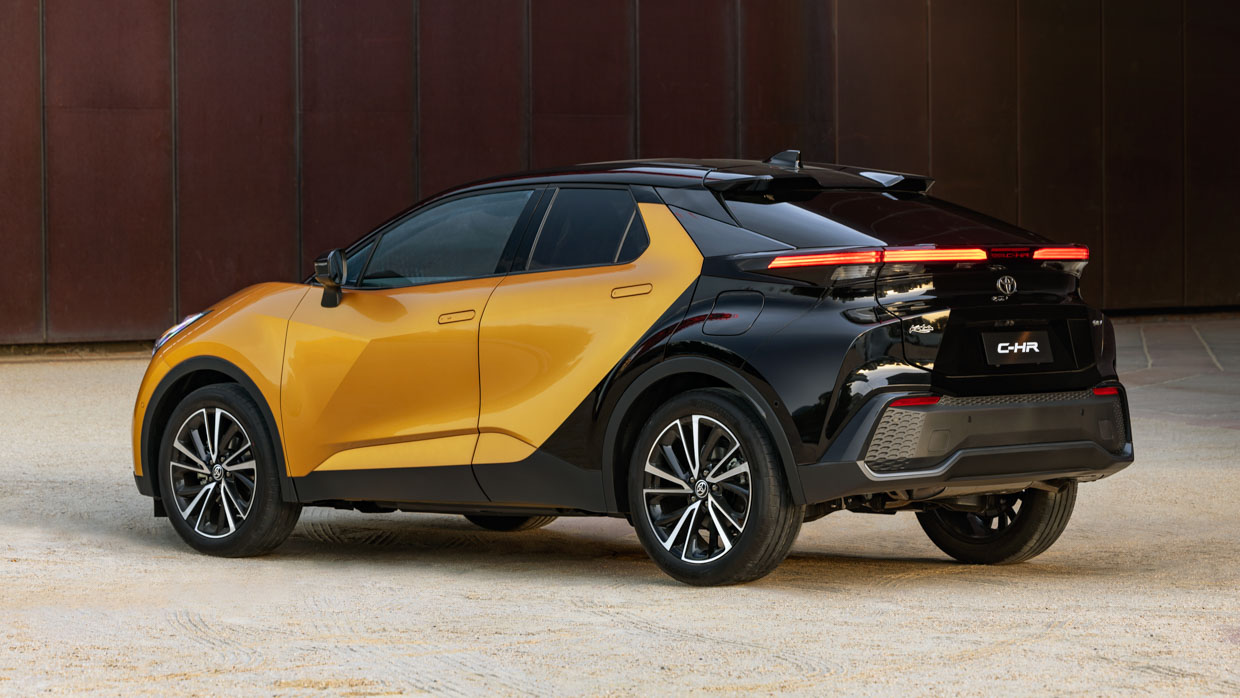
Much like the strikingly styled first generation, that’s something the second generation continues to lean into, with arguably an even bolder design language.
That includes everything from what Toyota dubs the ‘hammerhead’ front-end design, the integrated door handles, swooping rear-end, and the two tone paint colouring available at the higher end of the line up.
Like it or not, it definitely boasts some kerb-side presence and attracted a few looks from passers-by during our launch review shoot.
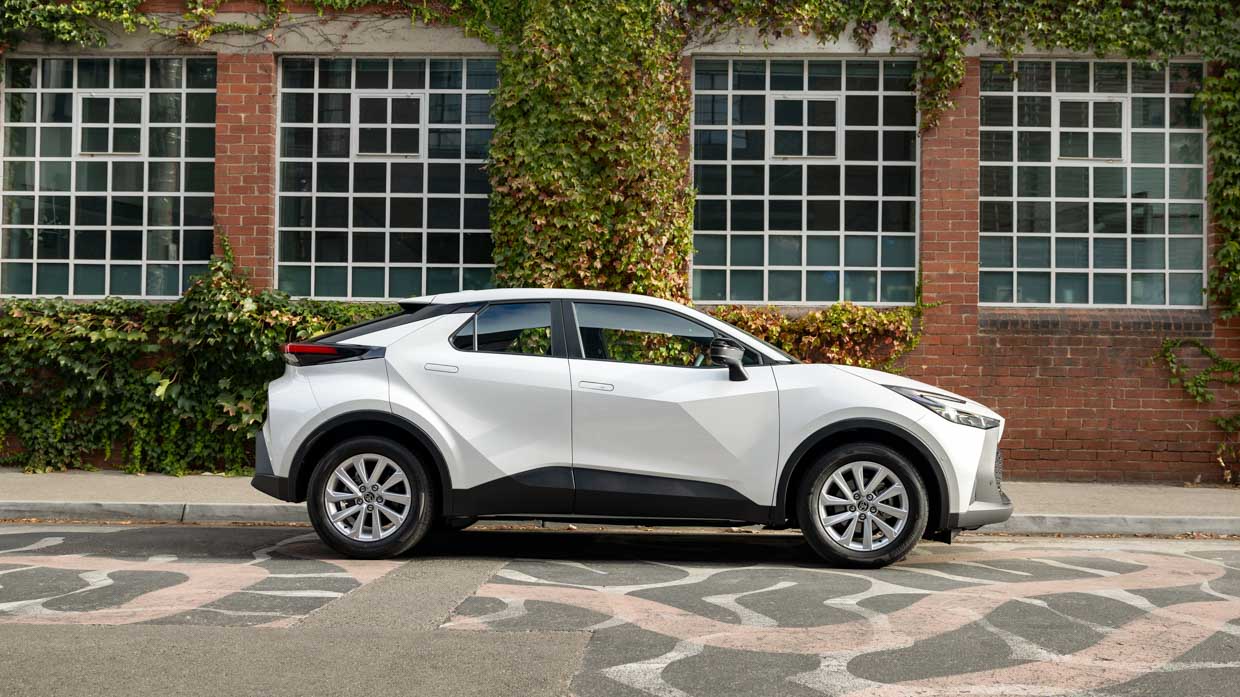
It will no doubt hold its own alongside other style-focussed rivals like the Nissan Qashqai and Juke, Renault Arkana and Peugeot 2008.
Having now landed in Australia, the new C-HR bucks the trend of most new-generations by being 25mm shorter than the previous car, though it is 35mm wider, with a total length of 4362mm and width of 1832mm.
While it hasn’t grown in length, the asking price has jumped a fair bit over its predecessor, coinciding with another significant change – it’s the first Toyota in Australia to go hybrid-only across the entire lineup, kicking off a trend which has now been followed by the Yaris and Corolla hatchbacks and the upcoming new Camry.
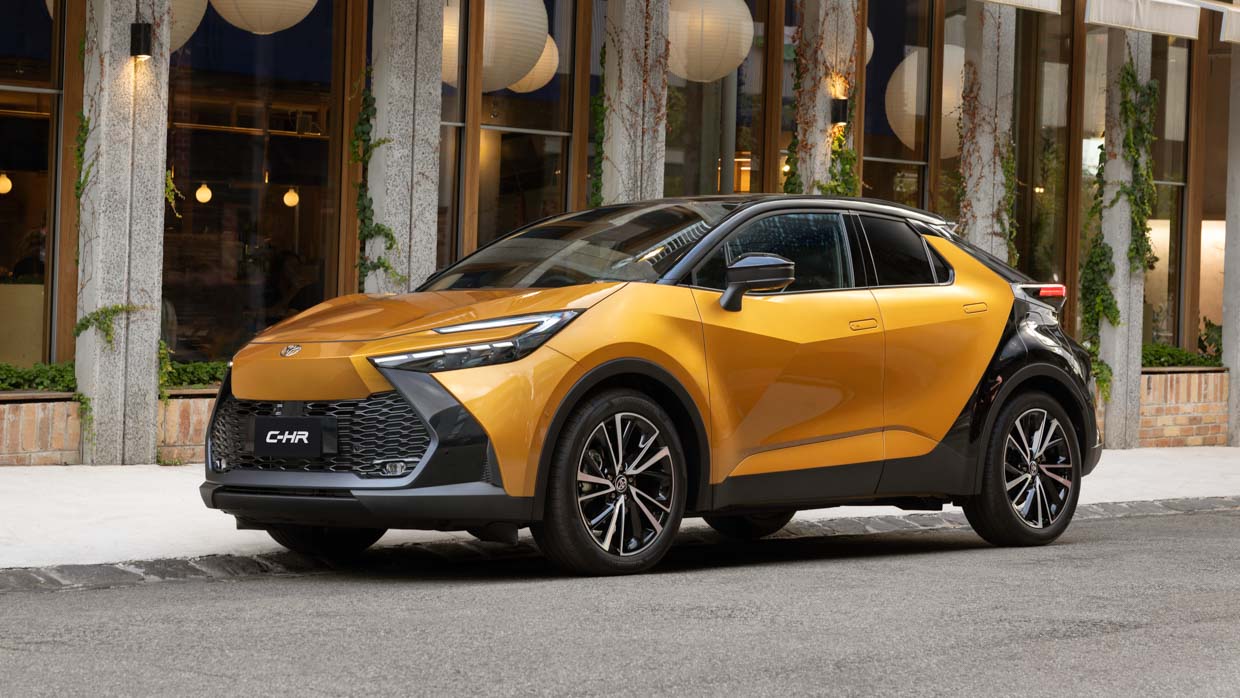
Our launch drive consisted of a mixture of country and highway driving as well as quite a bit of time in the C-HR’s natural habitat – slow-moving urban mid-morning Melbourne traffic.
So let’s find out how the new C-HR drives, and how good a job it does at being an urban SUV.
The new C-HR is available in three grades – the front-wheel drive entry-level GXL and mid-spec Koba, as well as the top-spec all-wheel drive GR Sport.
Priced at $42,990 and $49,990 respectively before on-road costs, prices for the GXL and Koba have risen by around $11K on equivalent grades from the previous generation.
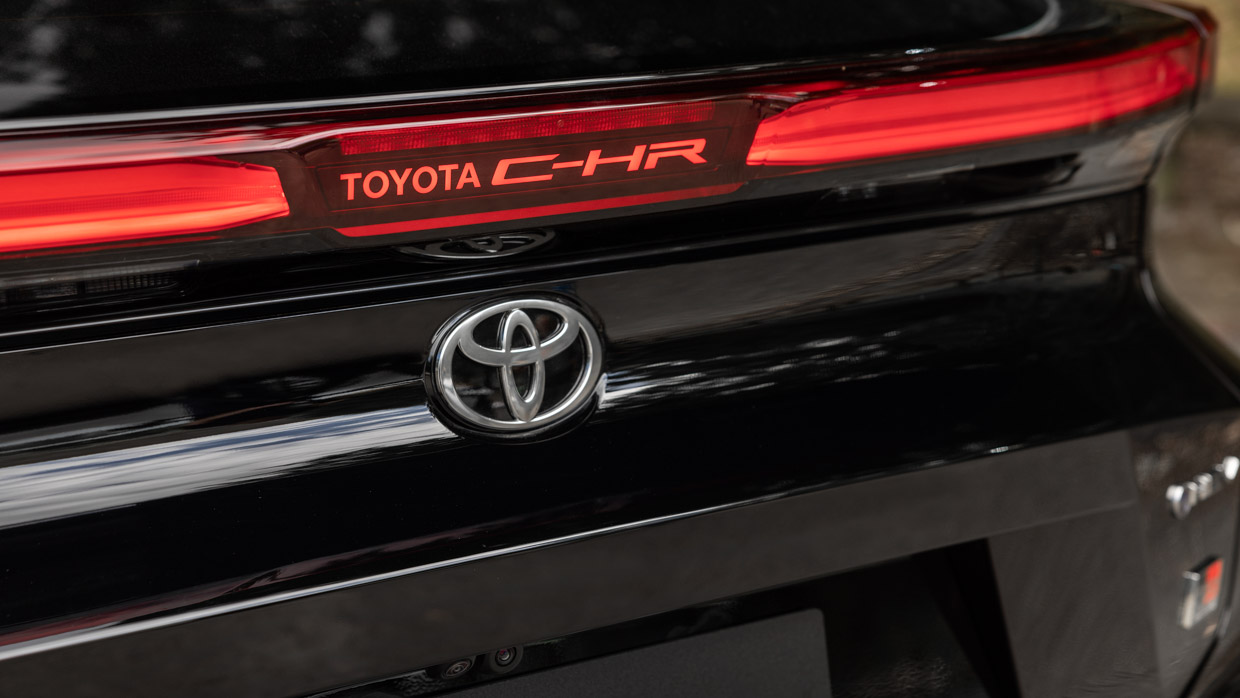
The range then tops out at $54,990 for the GR Sport, which is about $17,000 more expensive than the previous generation’s top spec model, although important to note that unlike the previous GR Sport, the new model is more powerful and all-wheel drive.
All variants come with a CVT automatic and Toyota expects the Koba to account for the largest sales volume at 70 percent, compared to 10 percent for the GXL and 20 percent of customers expected to go for the GR Sport.
In terms of standard features, all C-HR’s score features like:
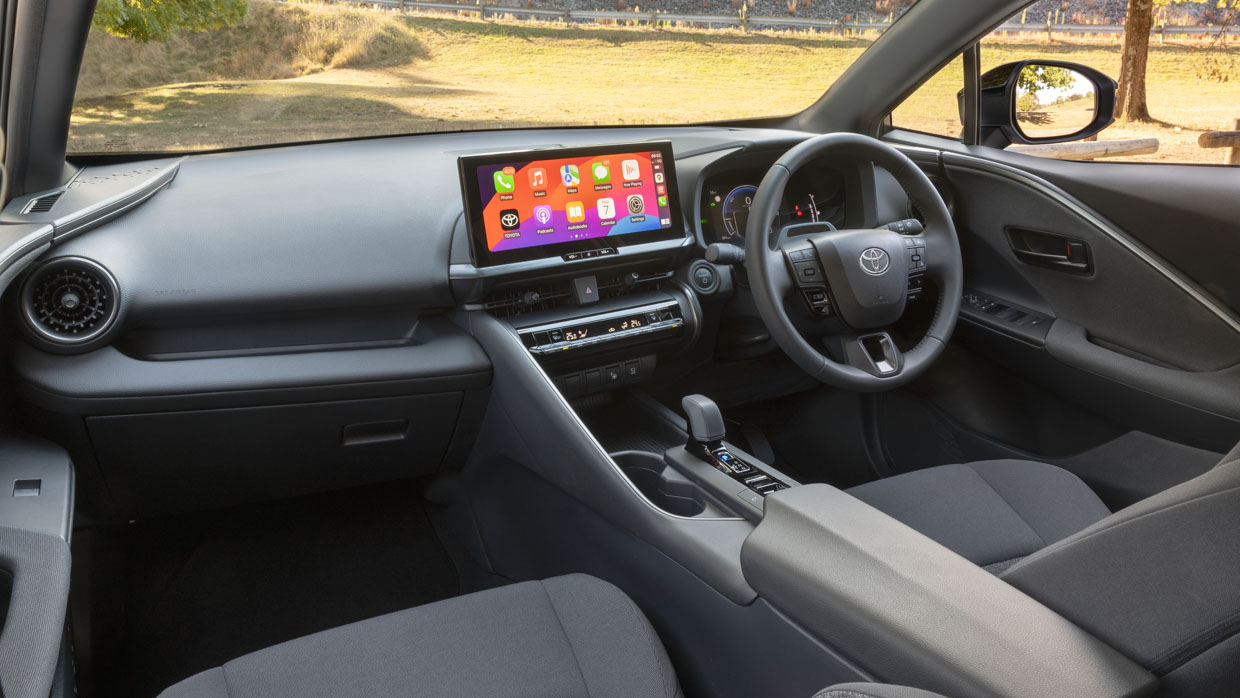
Standard spec for the GXL includes:
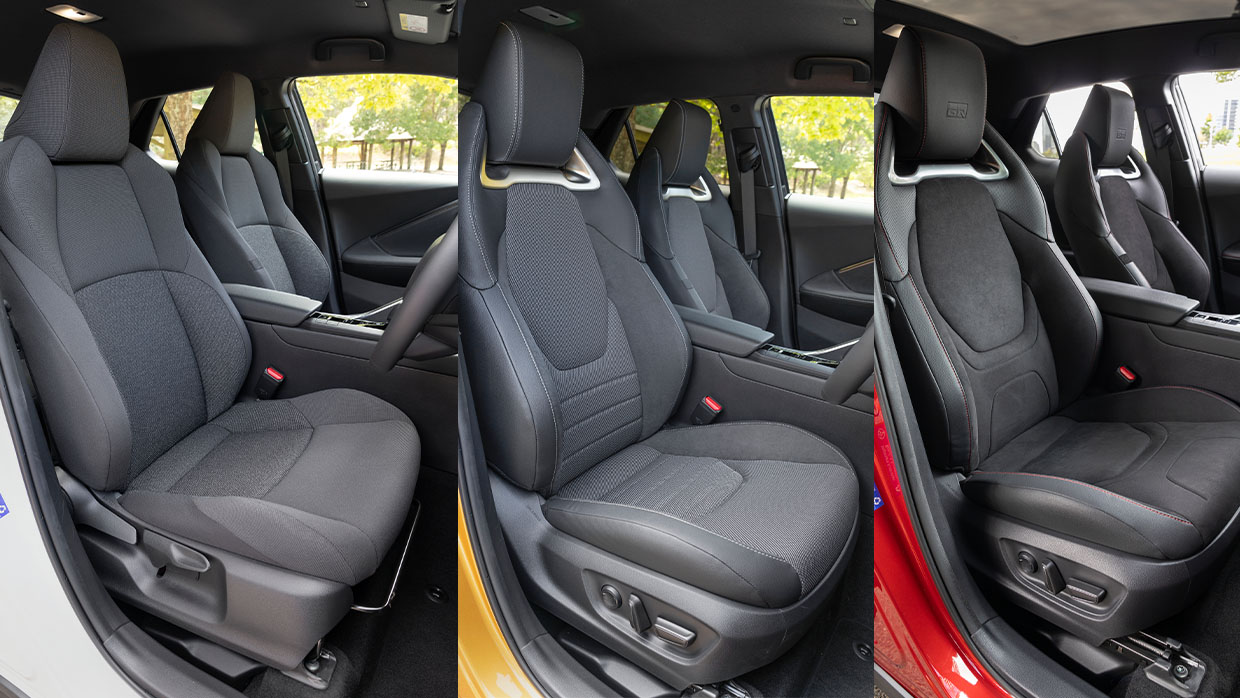
Left to right: the GXL, Koba and GR Sport grades
Stepping up into the Koba, owners will gain:
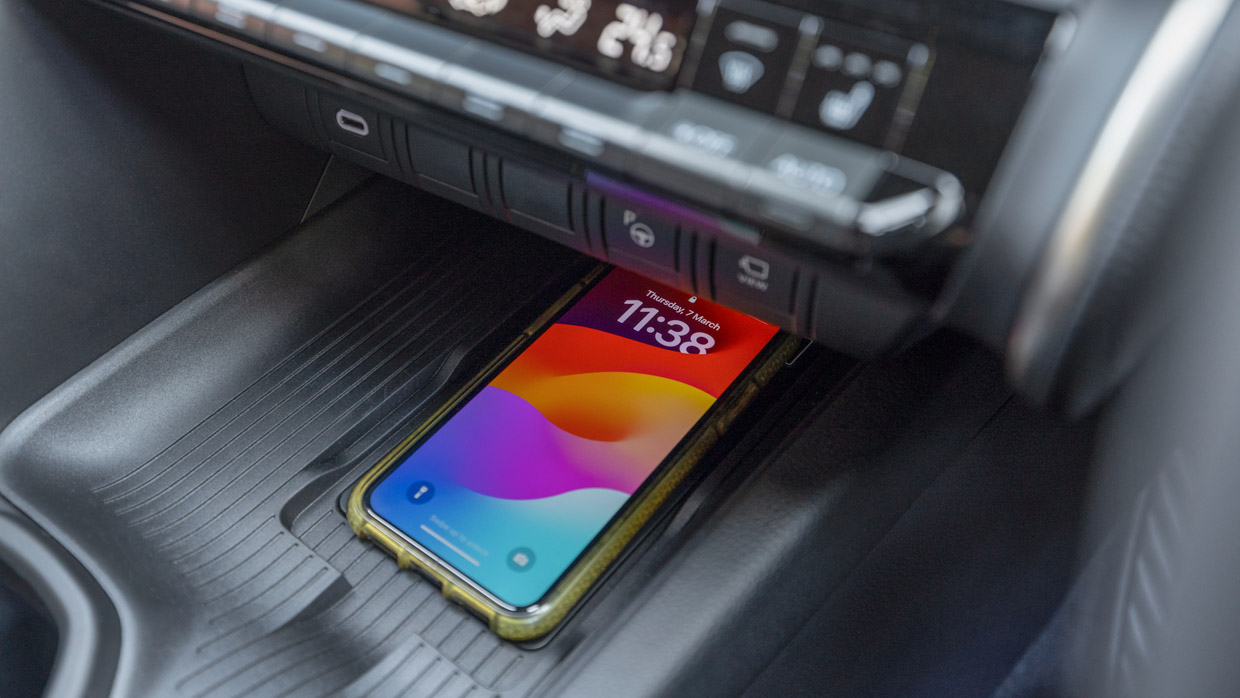
The flagship GR Sport adds:
Optional features available on the Koba and GR Sport include two-tone premium paint for $775, two-tone plus premium pain for $1550, and two-tone plus premium paint with a fixed panoramic roof ($2700).
The new C-HR uses Toyota’s latest fifth-generation hybrid technology and for the most part it delivers what you’d expect from a Toyota hybrid – a pragmatic, trouble-free experience which is pretty refined for the most part, albeit not the sportiest of drive experiences.
The front-wheel drive GXL and Koba are both powered by a 1.8-litre four-cylinder engine (72kW/142Nm) paired with an electric motor (70kW/185Nm), delivering 103kW total power output. A combined total torque figure wasn’t provided in the launch literature.
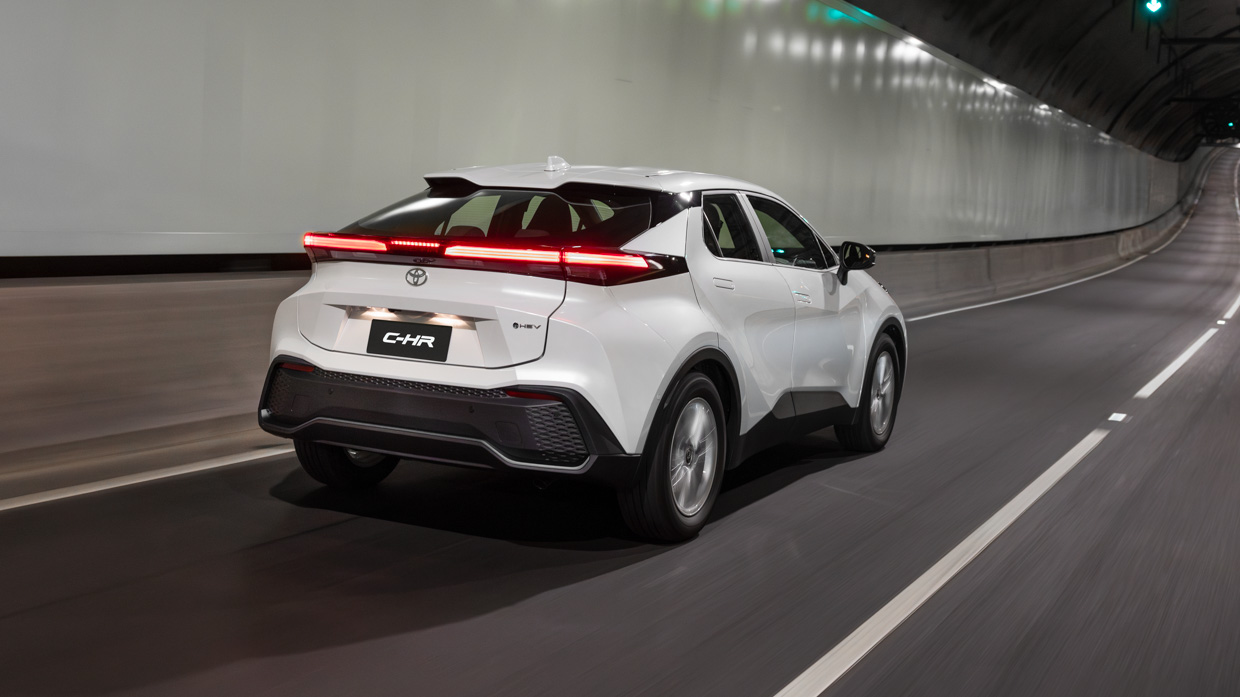
Meanwhile, the all-wheel drive GR Sport comes with a bigger 2.0-litre engine (112kW/188Nm), paired with two electric motors, one front (83kW/206Nm) and one rear (30kW/84Nm). This grade delivers 146kW total power output combined. Again, no combined torque figure was available in the launch literature.
To be expected given its hybrid pedigree, the C-HR’s petrol-electric hybrid powertrain is an effective system across the range. The transition between the EV mode and petrol engine felt super smooth and often imperceptible.
While the hybrid system is good, what felt a bit less inspiring was the CVT – it does a good job for the most part in day to day driving, however if you do push it it can get a bit droney and perhaps quite not as responsive as you’d like when really pushing it.
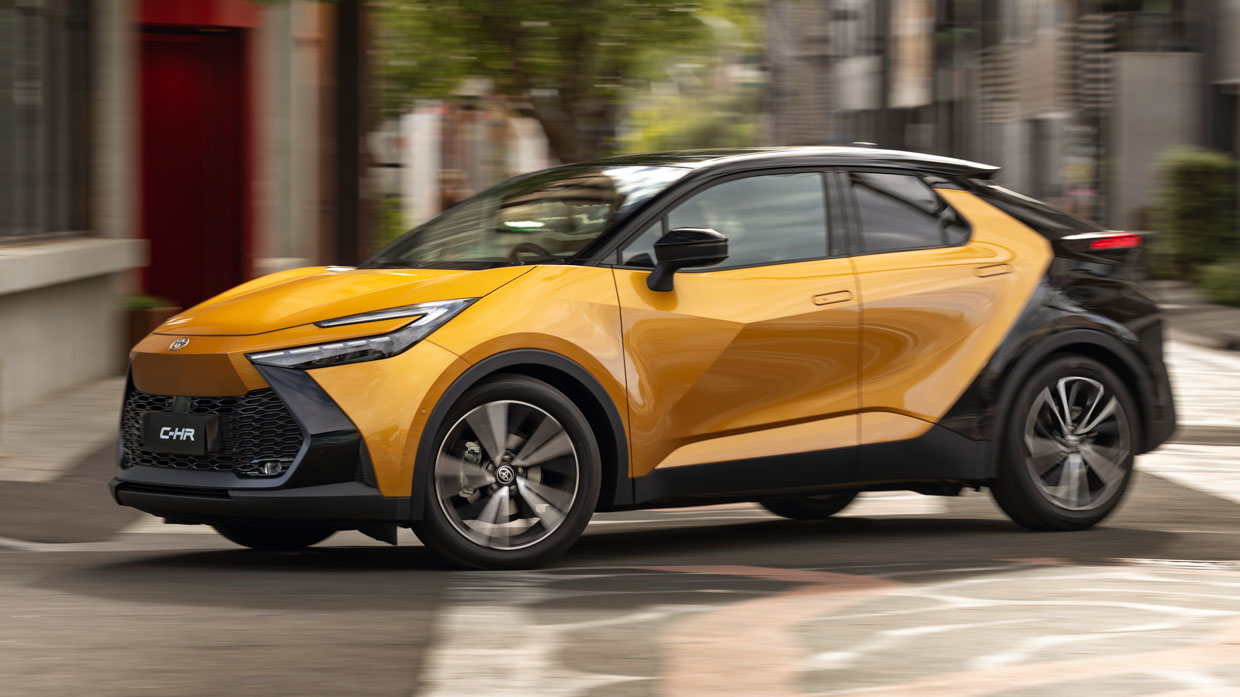
This was something I noticed particularly in the 1.8-litre C-HR, but less so in the more powerful GR Sport – the extra poke of that powertrain is definitely appreciated, but you have to pay an extra $5000 over the Koba for the enhanced experience.
But ultimately – this is an urban SUV, not a sports car – will that be a deal breaker for most people on the road? I doubt it. That said, if you are hell-bent on a C-HR and can stretch the budget, the GR Sport will definitely make for a more effortless driving experience in more situations.
The ride also felt comfortable and compliant for me across both Koba and GR Sport grades I drove, which featured the 19-inch wheels. Together with the comfy seats and pleasant cabin, it makes for a good and relaxing drive.
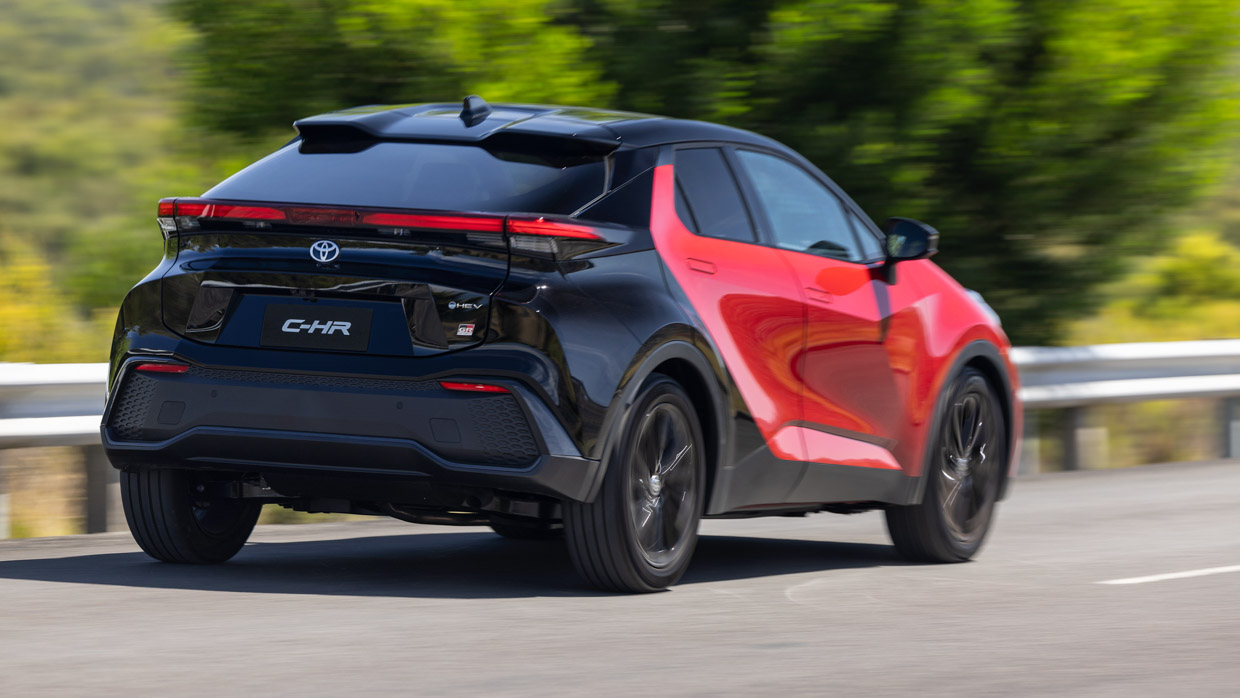
Brake pedal feel was good and easy to modulate and as was the steering which was light and faithful to inputs.
While I wouldn’t necessarily call it a fun car on a country road, the handling seemed ok within the limits of a small urban SUV on our launch drive which consisted of a traffic-filled urban commute and winding country drive.
The interior of the new C-HR is a nice place to be – it’s got a well laid out design that’s pleasing to the eye, and the general feel and ambience to it is quite comfortable and intuitive to get accustomed to.
This includes the seats which are comfortable and easy to find a good driving position using the power adjustment available on the Koba and GR Sport.
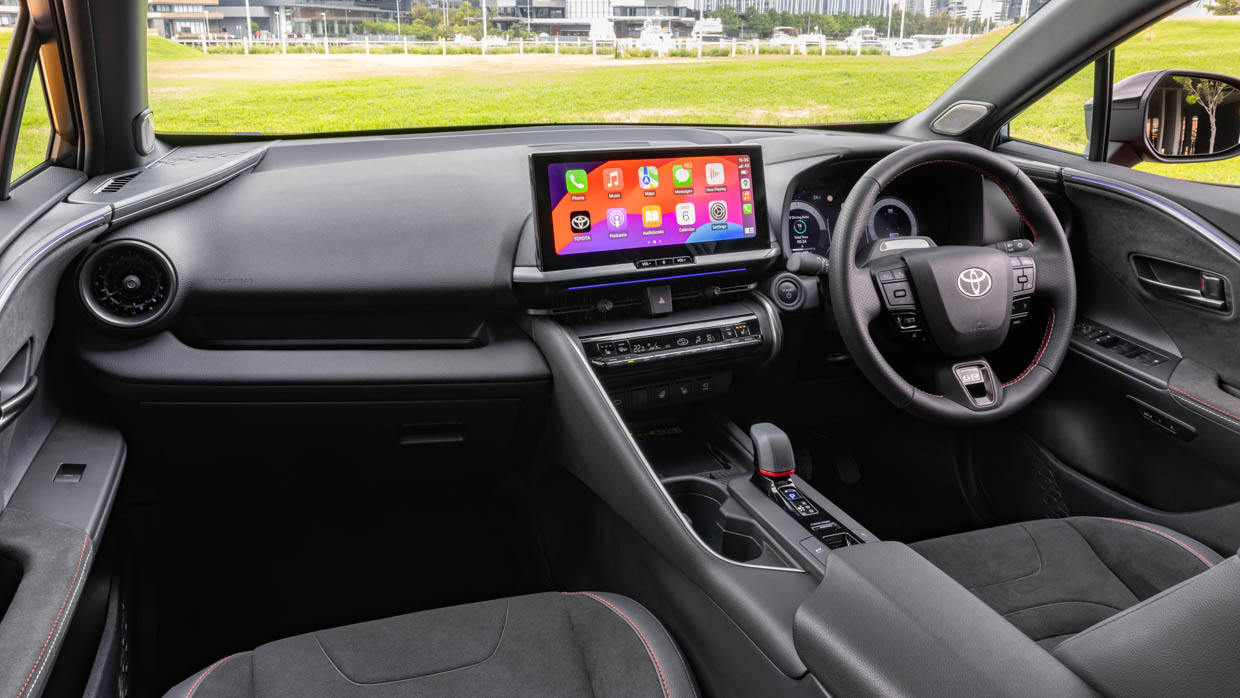
Those two models also get a 12.3-inch digital instrument display, while the GXL gets a 7.0-inch unit.
In addition, all grades get a 12.3-inch touchscreen infotainment system too which for the most part does a good job – it’s pretty intuitive and quick and you’ve got wireless Apple Carplay and Android Auto too.
Pleasingly, for this reviewer at least, there is a nice selection of physical buttons for things like climate controls, volume controls and your drive modes too – meaning, they haven’t been buried behind a screen like so many modern cars.
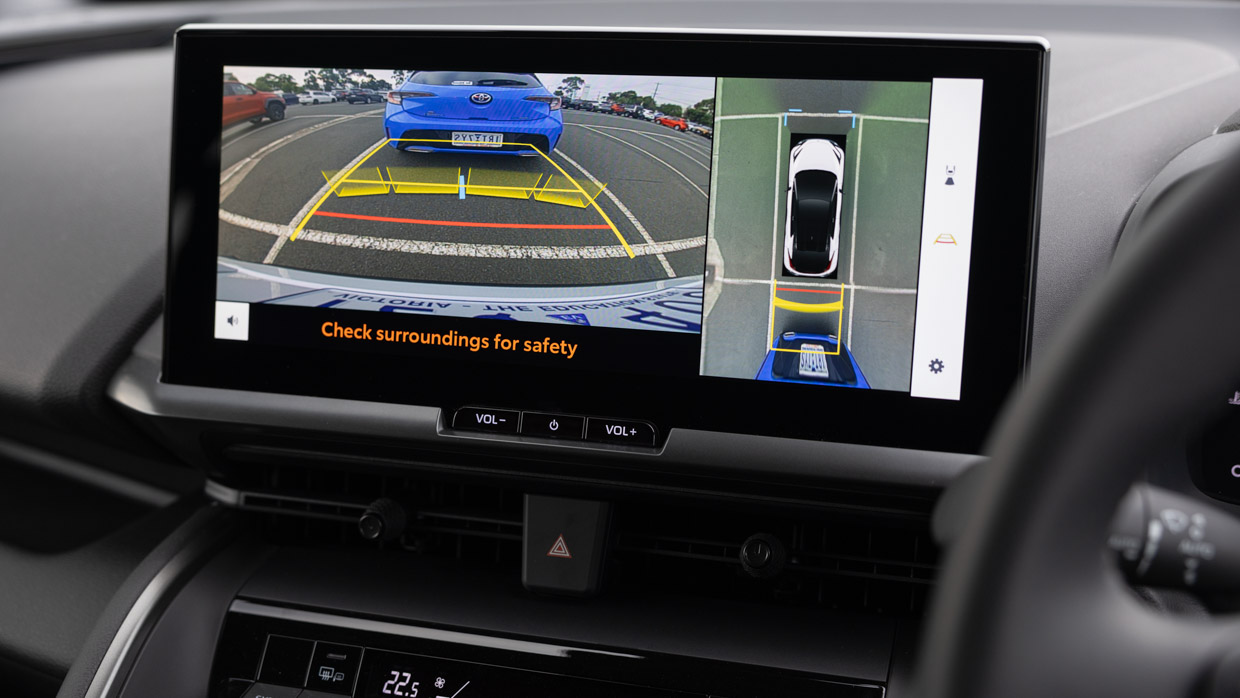
There seems to be decent space with cupholders, a phone charging pad, glovebox and centre cubby.
Forward visibility is pretty good although rear visibility isn’t incredible – but you do have a digital rear view camera on the Koba and GR Sport. A 360-degree camera is standard on all grades however, which is a welcome feature for newer drivers.
For the most part, the cabin felt relatively premium with a decent amount of soft touch materials. However, the inside of the A-pillar and dash section just below it had some movement to them when pressed – not quite as tightly screwed together as you might expect from Toyota.
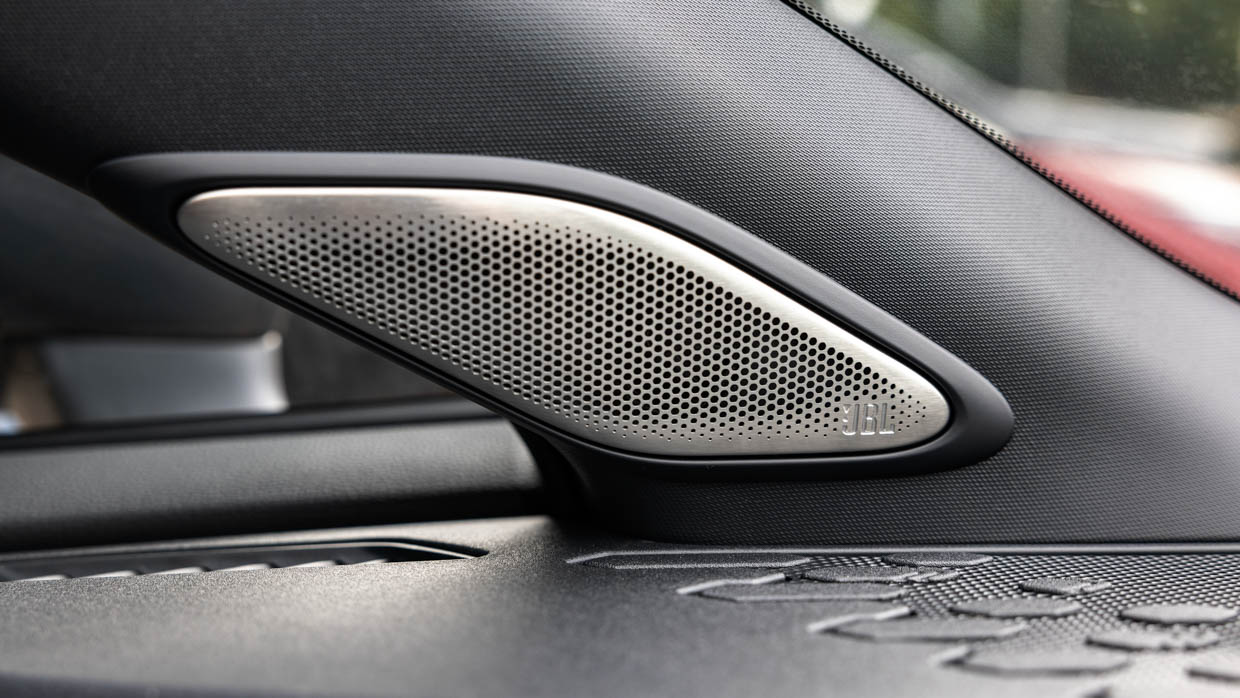
Toyota makes a big point of highlighting the ambient lighting which has dozens of different hues, which you get on Koba specs and up – this can be set to changes hues based on time of day or driving mode. Perhaps a bit of a showroom gimmick but there was lots of customisability with the colour choices which was nice.
On the Koba and GR Sport, customers can option a fixed panoramic roof, but it can only be optioned with the full ‘Two-Tone Plus premium paint’ for $2700. It also doesn’t have a sunshade, or need one, according to Toyota.
The brand says it uses infrared and heat reflection tech, and that the absence of sunshade saves weight and creates head room.
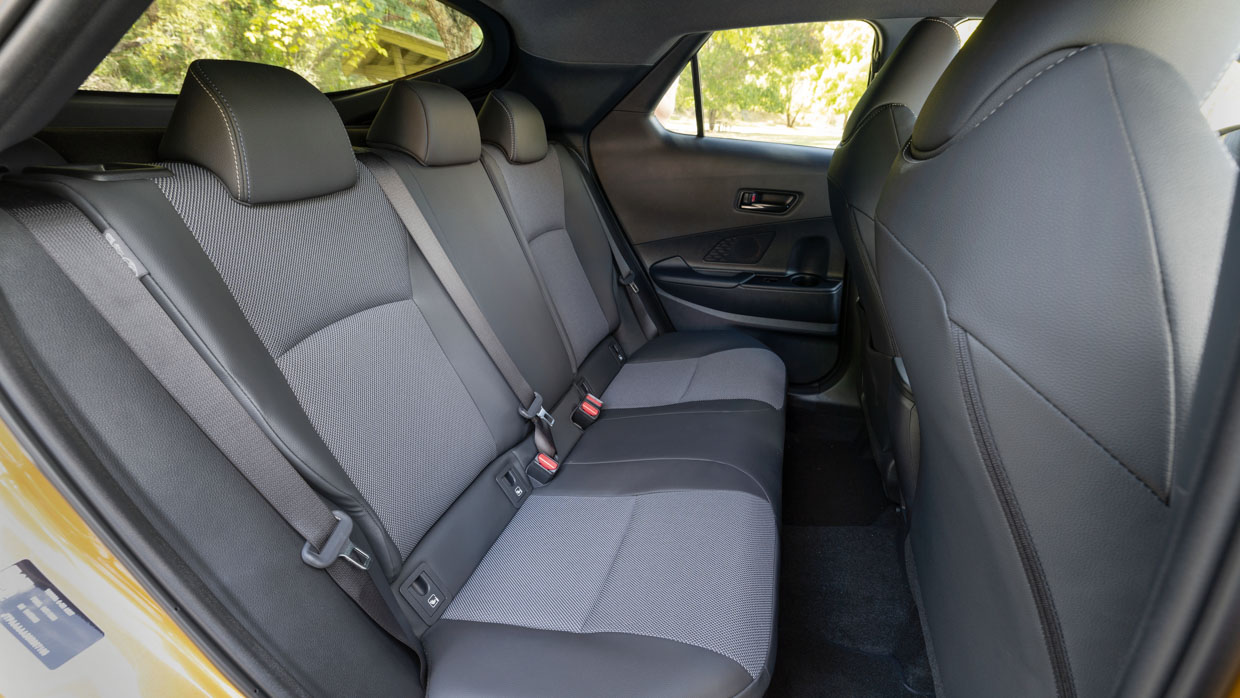
Pictured: the mid-spec Koba
On the topic of room, the rear-seats aren’t as well catered as the front.
Space is acceptable, but nothing more. Sitting behind my own driving position, I had enough leg and knee room at 183cm tall and the seats seemed comfortable at the rear.
Head room was just ok for me in the rear and there was generally a much more cocooned feeling given the size of the C-pillar and smaller windows. This impact on visibility is a consideration if you will regularly have rear-seat passengers.
In terms of features, even in top spec GR Sport form, the C-HR lacked rear air vents and a centre armrest. It had one USB-C connection and a map pocket on the back of the front passenger seat only.
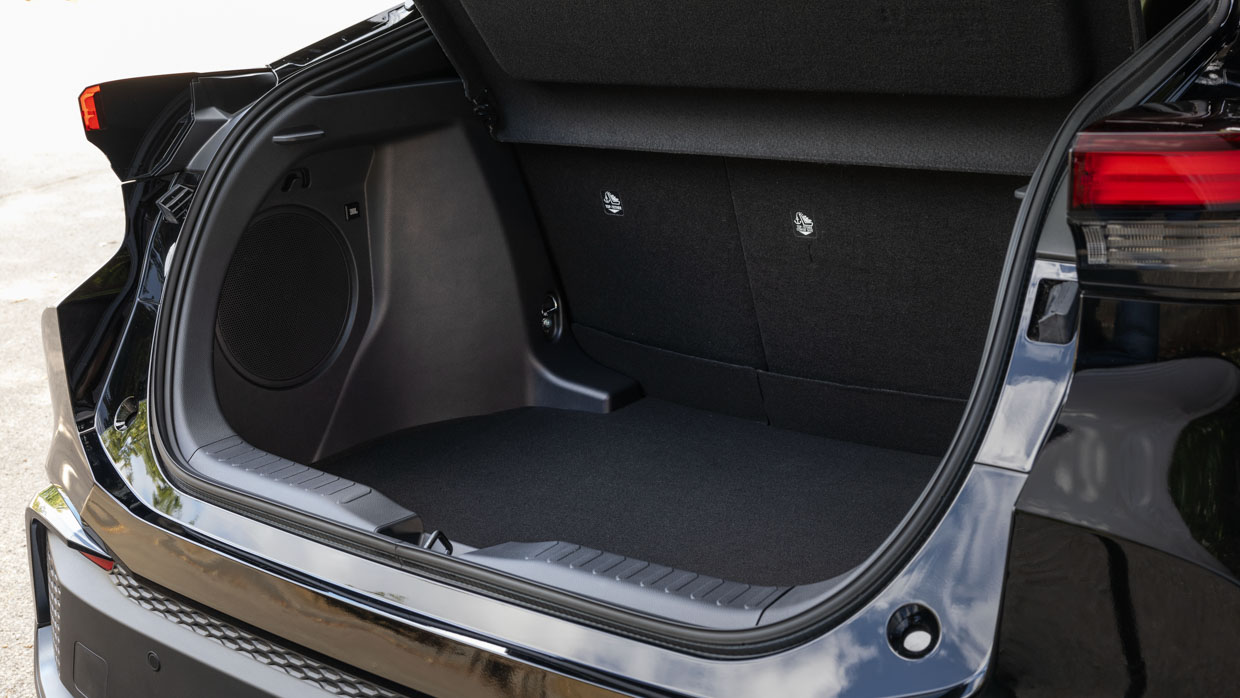
Unlike the manually operated GXL, both Koba and GR Sport variants get electric tailgates. The boot size is also different depending on grade – both GXL and Koba score 388L of boot space with the rear seats up, while the GR Sport scores 362L.
The GXL grade comes with a spacesaver spare wheel, while both the Koba and GR Sport have to make do with a tire repair kit.
You can fold the rear seats down 60/40 to reveal 1155L for the GXL and Koba and 1134L for the GR Sport.
The new C-HR has not yet been crash tested by ANCAP locally, however it does come packed with safety tech across the range via the Toyota Safety Sense suite.
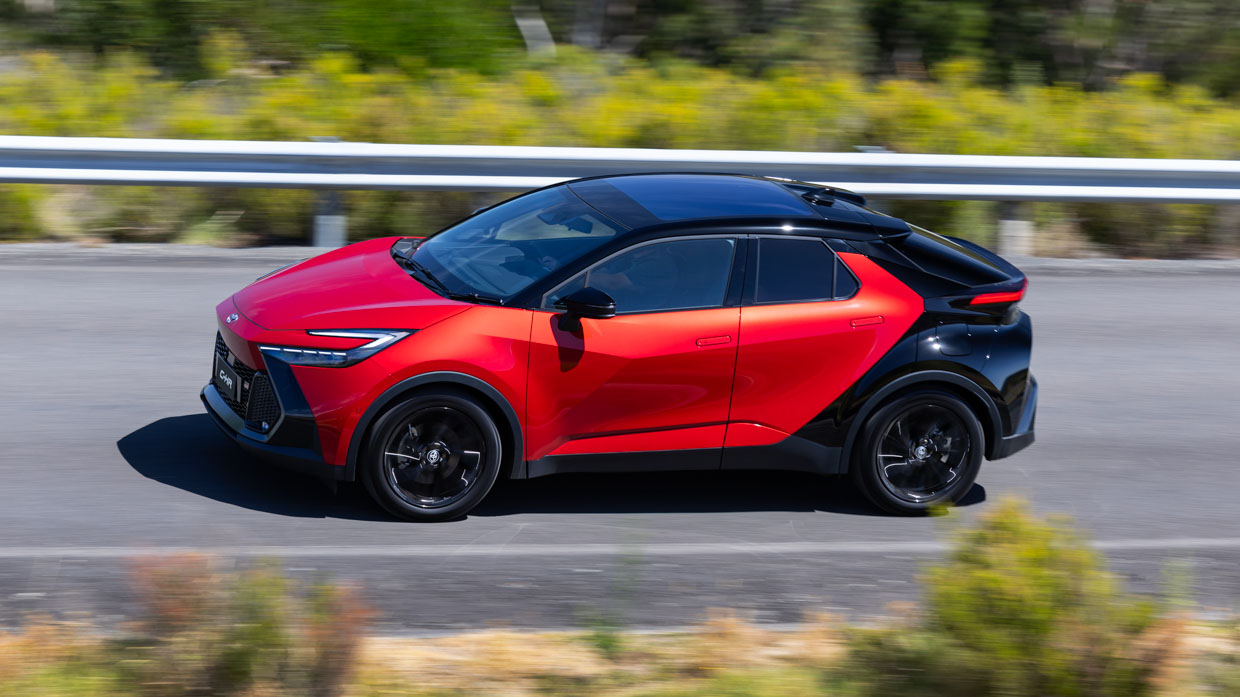
That includes features like AEB, active cruise control, lane trace assist, parking support brake, road sign assist (speed signs only), safe exit, a 360 camera and more. As well as this, all models are equipped with 10 SRS airbags too.
During our launch drive, I didn’t note any particular over-zealousness from the active safety systems such as the lane keep assist, however we will no doubt keep an eye on these when we get the C-HR in for a longer test.
In terms of running costs, the C-HR can take a minimum 91 octane fuel. Claimed fuel consumption on a combined cycle is 4.0L/100km for the front drive GXL and Koba, and 4.1L/100km for the more powerful AWD GR Sport.
Our initial drive of the C-HR range didn’t allow for adequate time to test the fuel consumption for ourselves but we did deliver 5.4L/100km across a two hour drive loop in the Koba which included both highway and urban driving, and a relatively spirited country loop.
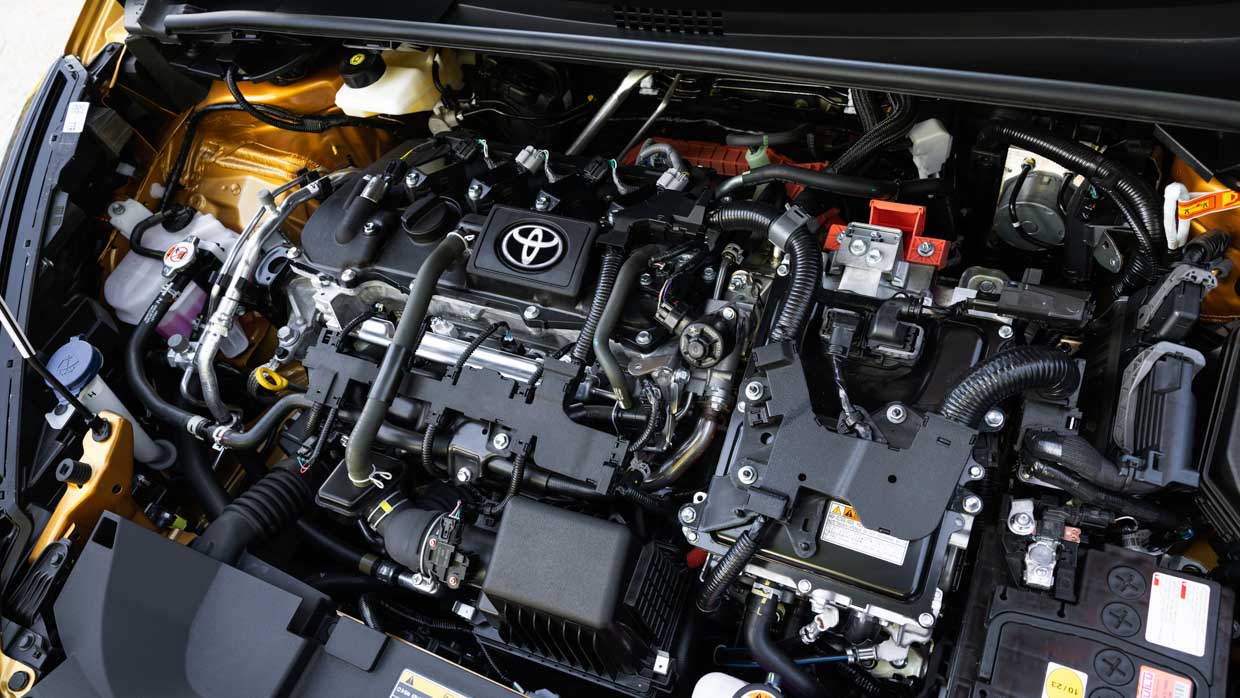
A shorter 30-minute urban drive loop in the Koba in Melbourne traffic the next day delivered a reading of 4.9L/100km. We will conduct a more rigorous efficiency test at a later date when we get the C-HR into the Chasing Cars garage.
Every C-HR is covered by a five-year unlimited kilometre warranty, with service intervals every 12 months or 15,000kms. Toyota offers capped price servicing for the first five years or 75,000km, whichever comes first. That will cost you $1000 over five years at $200 a service.
For those that want a funkily-styled SUV that has a bit of street-presence, the C-HR definitely has appeal – it’s more interesting to look at than a lot of other SUVs out there, and Toyota says that the ‘C-HR buyer’ is interested in exactly this.
While it pitches itself as a bit of a style statement, the rest of the package is pretty pragmatic Toyota – an easy-to-drive, if not sporty package, that does the urban commute more than competently and promises solid fuel economy.
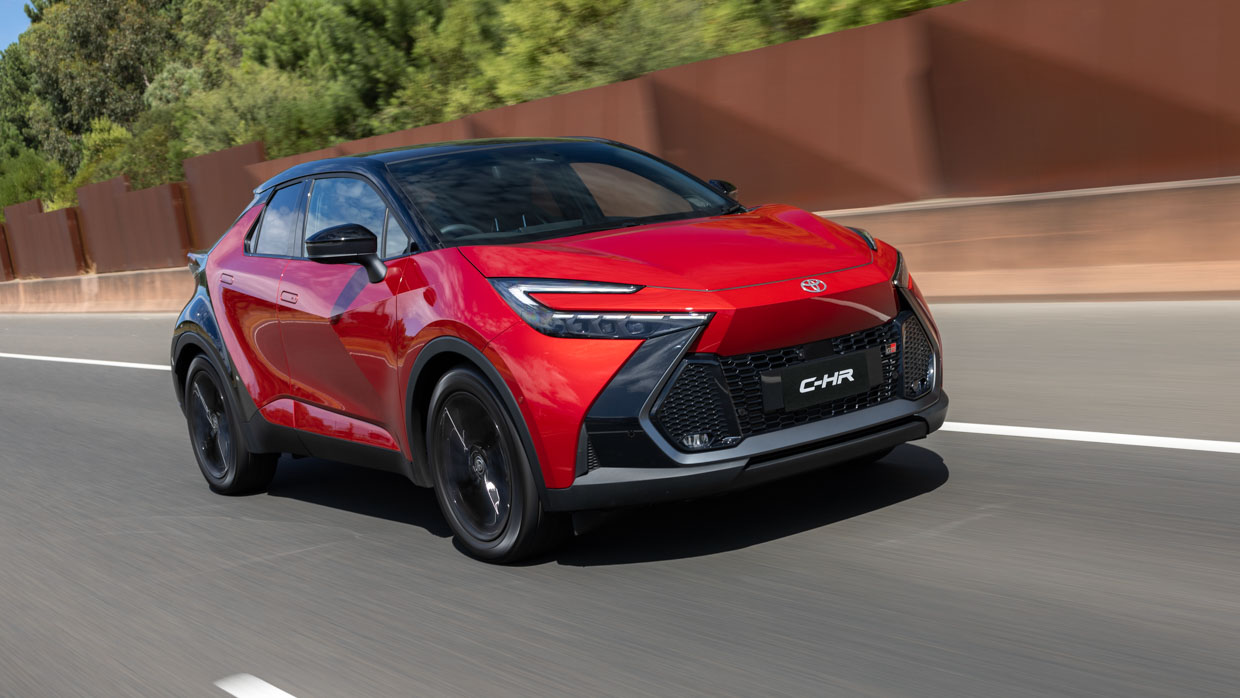
While it will target a niche market who don’t mind the less luxurious rear seat proposition, there is likely an buyer-base for this car – however, they just have to contend with a steeper asking price, with a top-spec C-HR GR Sport now more expensive than a RAV4 Cruiser Hybrid AWD in the medium size SUV segment above.
Toyota is confident the C-HR goes after a different buyer with very different needs, so ultimately, it’ll be based on personal taste whether you deem it worth it based on your individual needs and the style the C-HR offers.
Key specs (as tested)
About Chasing cars
Chasing Cars reviews are 100% independent.
Because we are powered by Budget Direct Insurance, we don’t receive advertising or sales revenue from car manufacturers.
We’re truly independent – giving you Australia’s best car reviews.
The estimate provided does not take into account your personal circumstances but is intended to give a general indication of the cost of insurance, in order to obtain a complete quote, please visit www.budgetdirect.com.au. Estimate includes 15%^ online discount.
^Conditions Apply
Budget Direct Insurance arranged by Auto & General Services Pty Ltd ACN 003 617 909(AGS) AFSL 241 411, for and on behalf of the insurer, Auto & General Insurance Company Limited(ABN 42 111 586 353, AFSL 285 571).Because we don’t know your financial needs, we can’t advise you if this insurance will suit you. You should consider your needs and the Product Disclosure Statement before making a decision to buy insurance. Terms and conditions apply.
Indicative quote based on assumptions including postcode , 40 year old male with no offences, licence suspensions or claims in the last 5 years, a NCD Rating 1 and no younger drivers listed. White car, driven up to 10,000kms a year, unfinanced, with no modifications, factory options and/or non-standard accessories, private use only and garaged at night.
^Online Discounts Terms & Conditions
1. Discounts apply to the premium paid for a new Budget Direct Gold Comprehensive Car Insurance, Third Party Property Only or Third Party Property, Fire & Theft Insurance policy initiated online on or after 29 March 2017. Discounts do not apply to optional Roadside Assistance.
2. Discounts do not apply to any renewal offer of insurance.
3. Discounts only apply to the insurance portion of the premium. Discounts are applied before government charges, taxes, levies and fees, including instalment processing fees (as applicable). The full extent of discounts may therefore be impacted.
4. We reserve the right to change the offer without notice.